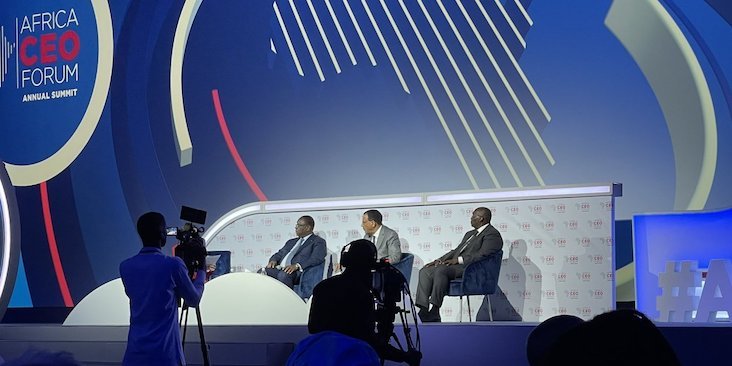[ad_1]
According to the Senegalese head of state, the exemptions to the financial sanctions against Moscow applied by European states to continue energy trade with Moscow should also be implemented to allow African countries to continue supplying themselves with fertiliser and wheat. “We are a collateral victim of this situation because of the weaknesses of our economies,” continued the Senegalese President, speaking alongside his counterpart Mohamed Bazoum of Niger and Tiémoko Meyliet Koné, who became vice-president of Côte d’Ivoire in late April.
Climate punishment
Extending the criticism addressed by Sall to the continent’s international partners – especially Western ones – whose concessional loans are “insignificant” in relation to the financing needs for irrigation, Bazoum recalled that Niger had a programme already in place to promote the exploitation of its surface and underground water resources. “The difficulty was to have the financial resources to invest,” the Nigerien President explained.
He pointed out another inconsistency with the continent’s external partners: this time in terms of climate. Following up on criticism shared during the COP26 in Glasgow in November 2021, which was strongly applauded by the African participants, the Nigerian head of state insisted on the role of the climate crisis in the deterioration of the security situation. He said that the commitment of $100bn in annual aid promised at the COP21 in Paris to help the countries of the South to face the climate crisis had never materialised.
The article continues below

Free download
Get your free PDF: Top 200 banks 2019
The race to transform
Complete the form and download, for free, the highlights from The Africa Report’s Exclusive Ranking of Africa’s top 200 banks from last year. Get your free PDF by completing the following form
Then the Nigerien President expressed his dismay at the bias against fossil fuels. “Banks were ready to grant loans to certain companies that wanted to exploit Niger’s coal and enable it to meet its energy needs. Today, there are no more banks willing to do so. We are being punished. It is an injustice,” the Nigerien President complained.
His Senegalese counterpart echoed this. While the latter recalled that renewable energy now represents 31% of Senegal’s energy mix, Macky Sall said: “It is inconceivable that those who have exploited oil, coal and fuel oil for more than a century should prevent African countries from developing their resources.
Security risks
The Senegalese head of state, who is also the current chair of the African Union (AU), was particularly focused on the security risks, which is an not the issue, according to Bazoum.
“The basic issue is the financing of the fight against terrorism,” noted Sall. “In Asia, in Libya, there are global coalitions to fight against terrorism. In African theatres, few countries are involved. The financing of this fight is the responsibility of the United Nations Security Council, whose primary role is to ensure peace and security in the world,” the Senegalese head of state pointed out.
Continental approach
Also participating in the meeting, Makhtar Diop, director general of the International Finance Corporation, also returned to the link between climate crises and conflicts. He insisted on the need for a “continental approach and a more structured and strong integration of the private sector” in the fight against climate change “directed towards adaptation, water management […] and urban and territorial planning”.
On a more optimistic note, Côte d’Ivoire’s vice-president Tiémkoko Meyliet Koné highlighted the progress made at the 15th UN Conference on Desertification and Drought (COP 15) held in Abidjan in May, in which 196 governments participated directly or virtually. This is proof of the “interest and consideration” for these issues. “Results are expected and will be implemented by many countries,” he said.
“COP15 was preceded by a summit of heads of state that validated the Abidjan agreement. This is a model that can enable all states to set up a system of reforestation and the fight against desertification,” he said.
*The Africa CEO Forum is co-organised by Jeune Afrique Media Group
[ad_2]
Source link
